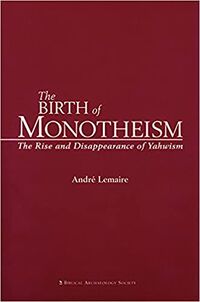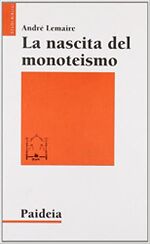Difference between revisions of "File:2003 Lemaine.jpg"
| Line 66: | Line 66: | ||
[[Category:Monotheism (subject)|2003 Lemaire]] | [[Category:Monotheism (subject)|2003 Lemaire]] | ||
[[Category:Monotheism, Origins (subject)]] | |||
Latest revision as of 04:06, 16 April 2024
Naissance du monothéisme: point de vue d'un historien (2003) is a book by André Lemaire.
Abstract
"In this work, Lemaire traces the origins of monotheism in relation to the birth and fall of Israelite Yahwism. Although much of his work parallels previous scholars, his final section, on the decline of Yahwism offers a new insightful approach to the topic of monotheism. To demonstrate his thesis, Lemaire describes three principle stages by which this process ensued. The story of Yahwism first begins as a local cult sometime around the 13th century BCE in the southern Judean desert. Yet this local cult quickly evolves throughout the time of the kings into a form of Israelite monolatry, whereby Yahweh becomes considered the exclusive god of the Israelites. Around the time of King Josiah, in the 7th century BCE, a sharp rise in the number of Yahwistic names in Israel suggests that this form of Israelite Yahwism had reached its pinnacle point. This nationalized form of Yahwism, however, encounters a significant crisis during the time of the Babylonian Exile, which forces a marked shift in the religion. In order to make sense of this catastrophe, the prophets could either present their local god, Yahweh, as being defeated by the gods of the Babylonians or the prophets could present Israel with a new understanding of who Yahweh was. Not surprisingly, they choose the later option and thanks to them, the religion of Israel evolved into a universal monotheism. The third stage of the religion occurred in the period leading up to the first Jewish War and climaxed with the destruction of the Second Temple in 70 CE. During this time period, little by little persons in Israel began to refrain from using the word, YHWH, for reverential purposes until it became the exclusive right of the High Priest only on the day of Yom Kippur. After the Romans destroyed the Second Jewish Temple, the name of YHWH, especially in prayer and worship, could no longer be said by anyone at all. Accordingly, the disappearance of YHWH, gave rise to the transcendental character of the divinity. This unique, transcendental God became the God of "Everywhere and All, not just of the Temple and the people of Israel... Judaism was now a religion of universal monotheism" (131)." --Deborah Forger
"In this ground-breaking book, originally published as Naissance du Monotheism, world-renowned expert Andre Lemaire explores the development of one of the most revolutionary concepts of modern humankind."--Publisher description.
Editions
Published in Paris [France]: Bayard, 2003.
Translations
Contents
- Introductin
- 1 - Before YHWH
- 2 - The Origins of Yahwism
- 3 - Early Yahwism in Israel's Central Hill Country
- 4 - YHWH the God of Israel
- 5 - Yahwism of the First Temple Period: Monotheism or Monolatry?
- 6 - The Divided Kingdom and the Resurgence of Baalism
- 7 - "YHWH and His Asherah"? Did the God of Israel Have a Consort?
- 8 - Yahwism and Aniconism
- 9 - The Rise of the Prophets
- 10 - The Religious Reforms of the Judahite King Hezekiah
- 11 - Astral Worship and the Religious Reforms of King Josiah
- 12 - The Religious Crisis of Exile
- 13 - The Emergence of Universal Monotheism
- 14 - Israelite Religion in the Persian Empire: YHWH as "God of Heaven"
- 15 - The Temple, the Synagogue, and Absolute Aniconism
- 16 - The Disappearance of YHWH
External links
- [ Google Books]
File history
Click on a date/time to view the file as it appeared at that time.
| Date/Time | Thumbnail | Dimensions | User | Comment | |
|---|---|---|---|---|---|
| current | 16:25, 27 November 2021 |  | 343 × 499 (12 KB) | Gabriele Boccaccini (talk | contribs) |
You cannot overwrite this file.
File usage
There are no pages that use this file.

